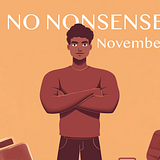Why Worry About Tomorrow’s Problems Today?| No Nonsense November (22/26)
Exploring the balance between present peace and future planning.

Somewhere between juggling today’s tasks and bracing for tomorrow’s unknowns, we lose sight of the present moment. It’s not just stress — it’s a habit. We replay scenarios, predict failures, and brace for challenges that haven’t even surfaced. But here’s the truth: worrying about tomorrow’s problems won’t prepare you — it will only steal what you need most right now: clarity and calm.
No Nonsense November is more than just a writing challenge — it’s a month-long commitment to cutting through the noise and focusing on what truly matters. Every day this month, I’m sharing an article that explores life’s challenges, lessons, and untapped potential, digging into topics designed to inspire growth, clarity, and perspective. This challenge isn’t about perfection. It’s about showing up consistently, sharing insights, and embracing the messy process of self-reflection and creativity. Some days, the words flow effortlessly; others, it’s a struggle to make sense of the chaos. But that’s the beauty of it — pushing through the resistance to uncover something worth sharing. If you want to read more about it check out the full article detailing everything:

Introduction:
It’s a feeling all too common: “What am I going to do about this?” “When am I going to get around to this other task?” “Oh shoot, next month this event takes place.” It can feel like drowning in a sea of responsibility, yet it’s water you’ve yet to enter.
Why do we spend so much time out of today feeding thoughts of tomorrow? For some, it’s likely anxiety; for others, procrastination. Perhaps they don’t want to be so engaged in the now that they unintentionally drift into the future, trying to get ahead of what they might be feeling, hoping to prevent it from happening again.
It’s often associated with uncertainty or the unknown. What we face now is projected onto the future, or what’s upcoming sneaks its way into the now. This feels counterintuitive at times, but at other times, getting ahead can provide a sense of ease and empowerment.
We’ve discussed both sides of this coin: the importance of living in the present and the equal importance of being prepared for the future. Today, I want to explore the scope of this scenario. How far into the future should we plan? When does it become something we need to think about now? Is it a week from now, a month, or even further?
As we wonder why we let tomorrow’s shadows creep into today’s light, let’s dive deeper into understanding what we’re truly dealing with. This brings us to the question:
How big of a task are we soon to face?
To understand this more clearly, we first need to determine the magnitude of the task at hand and its implications. It’s hard to deny that you’ve already spent time worrying about it, but evaluating this can help us gauge how significant the issue is and how much of our time it’s worth stressing over in advance.
Once you understand the mission and have a rough outline of what the task demands, you might begin to feel a sense of ease. The biggest obstacle was always the unknown, but after outlining the task, we gained a stronger understanding of what we actually needed to worry about. This provides a foundation for deciding how much of our mental space it will occupy and how far in advance we should start worrying.
The significance of the task and its timing are integral to each other. It’s challenging to determine how much energy it requires in advance without understanding its full scope. Understanding the task is just the beginning. Now, let’s shift our focus to how our perception of our own abilities and the time we have can either aid or hinder our approach to these challenges:
The Dynamics of Time and Skill Perception
However, there’s another layer to consider: how we perceive our skills and the time we allocate to tasks. Sometimes, we might underestimate our capabilities or the time we truly need, leading to last-minute rushes. Conversely, overestimating the time needed can be just as detrimental. When given an extended timeframe, people often stretch their work over unnecessary periods, diluting focus and efficiency.
A smaller time constraint can sometimes lead to better outcomes. With less time, ingenuity is forced to the surface. There’s a pressure that encourages diligence, ensuring fewer mistakes and more mindful progression. This urgency can be beneficial, pushing us to work more effectively and creatively. However, this approach risks sliding into procrastination, where tasks are left until the last possible moment, leading to cutting corners and hoping for the best.
What Should I Focus on Next?
Ideally, the goal is that we don’t allow any stress into our lives at all. The objective here isn’t to open the floodgates and spend all our time worrying about what’s in store for our futures. Instead, it’s about wisely using the time and slight bit of energy we’re already spending on future planning. With a little planning and strategy, we can give it the attention it needs and then move on, knowing we will address it when the time comes.
A phrase that has always resonated with me, especially in times of future anxiety, is:
“If it’s out of reach, it’s out of my hands — and if it’s out of my hands, it’s out of my control.”
This mindset has evolved over the years but started taking shape with the concept of focusing on one month at a time, recognizing that much can change within that span. Eventually, this timeframe shrank to a week.
It’s much easier to manage a few days ahead rather than a whole month. If your worries extend that far, they should be flexible or loosely established since they’re quite far into the future, depending on where you are in the month.
Once you have the task’s scope in mind and understand the constraints, you can determine how many days are necessary to start working on it, ensuring you have plenty of time to handle it without last-minute pressure. With these insights into how we perceive time and our skills, we’re better equipped to tackle the future.
Conclusion
This article isn’t meant to solve a problem or overcome an obstacle but rather to explore a thought that’s been lingering. As I was dreading getting things done before the responsibilities of the next month arrived, I started putting more importance on these tasks, perhaps to avoid what I must do before the month’s end.
I hope this post encourages you not to take up your present with worries about a future that might never come. Live in the today, for it’s the only time that’s fleeting. Being present can improve what can be fixed immediately, with no planning necessary.
Building this habit might enhance your strength and self-esteem. You might start to change how you deal with upcoming problems, recognizing that you’ve faced harder challenges before, so why would this one be any different?
Now, I challenge you to take a moment right now to:
- Write down one thing you’ve been worrying about for the future.
- Set a small, actionable task you can do today to either prepare for it or address it, without letting it consume your day.
- Commit to a daily check-in with yourself, where you assess what you can let go of and what truly needs your attention today.
By engaging in these steps, you’ll begin to see that much of what we worry about is within our control or can be managed more peacefully than we often allow ourselves to believe. You’ll discover that by focusing on the present, you’re not just surviving; you’re thriving, with a newfound understanding that there’s often little to worry about when you take action today.
Thank you for taking the time to read today’s article. If this resonated with you, I’d love to hear your thoughts or feedback. Let’s keep the conversation going:
📩 Email: Share your insights at [email protected]
📰 Substack: https://substack.com/@mostlysocials
☕ Ko-fi: https://ko-fi.com/mostlymedia
🐦 Twitter: https://x.com/mostly_media
🌌 Bluesky: https://bsky.app/profile/mostly.media
Did you miss yesterday’s article? Dive into it here:




